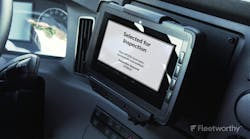After more than two years, Navistar and TuSimple are abandoning their agreement to co-develop autonomous trucks, the two companies announced Dec. 5.
The OEM, which produces International Trucks in the U.S., and the self-driving technology company first started working together in 2018 before forging a formal joint-development agreement in 2020. That agreement was to create Level 4 self-driving Class 8 tractors for production by 2024. It also included Navistar taking a minority stake in TuSimple.
See also: Fleets begin to get a feel for the future of moving freight
Since that agreement was made, Navistar was acquired by Germany-based Traton, Volkswagen AG’s commercial truck division, in 2021. TuSimple has faced executive turmoil over the past year—that included firing its CEO and rehiring Cheng Lu, who led the company as chief executive from September 2020 to March 2022, a period that saw TuSimple reach milestones in its self-driving truck technology.
"I decided to return as TuSimple's CEO to address the challenges ahead and to set us on a path to long-term stability,” Lu said on Dec. 5. “We have proven our technology works, and I'm committed to addressing the concerns of stakeholders. I firmly believe in this company and its ability to improve the safety and efficiency of the trucking industry through world-class autonomous driving technology."
Neither Lu nor Navistar VP Srinivas Gowda shared the reasoning for the scrapped partnership. But a Navistar spokesperson told FleetOwner that the truck maker would retain its minority stake in the AV company. Navistar plans to share more about its autonomous and technology strategies in the coming weeks, the spokesperson said.
"Navistar believes autonomous driving technologies will be a key component of a future transportation and logistics system and is committed to the development of a safe and efficient autonomous driving solution," Gowda said Dec. 5.
In 2020, when the companies announced their agreement, Navistar told FleetOwner it planned to launch the driverless technology on its International LT Series tractor for fleets operating in the Southwest for routes between distribution centers.
“We’re focusing on on-highway vehicles that spend a vast majority of their time — 95% of the time—just pounding away the miles with very little surface street driving and nothing in an urban environment,” Chris Gutierrez, Navistar’s engineering for autonomous vehicles, told FleetOwner. “We’re just talking about getting off the highway, going to your local distribution center, which in most cases are one or two turns off the interstate.”




